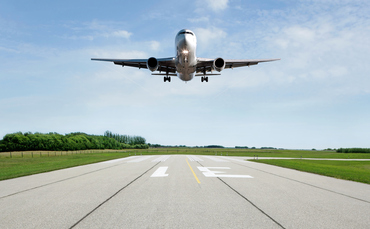An analysis of business travel emissions from 15 global consulting firms undertaken by Transport & Environment (T&E) has revealed they last year slashed emissions by an average of 46 per cent compared to pre-pandemic levels.
However, the green group warned several of the sector’s biggest players are at risk of seeing the number of business flights creep back up towards 2019 levels.
Carried out as part of T&E’s Travel Smart Campaign – which aims to keep travel emissions at 50 per cent below pre-pandemic levels by reducing frequent flying, making the most of rail journeys, and utilising remote working technologies – the analysis found two consultancies, Accenture and EY Global, kept business travel emissions last year at less than half the pre-pandemic level.
A further seven companies – Accenture, EY Global, PwC, Capgemini, KPMG, Deloitte, and Jacobs – managed to hit T&E’s campaign benchmark in 2022.
But while each of the 15 companies featured in the study of CDP and Science Based Targets Initiative data have reduced their travel emissions, eight fell short of Travel Smart’s target in both 2022 and 2023. Danish firm Ramboll Group’s travel emissions were just 14 per cent down on 2019 levels last year.
Moreover, while 12 of the 15 companies analysed have set business travel emissions targets in recent years, T&E claims Accenture, KPMG, and Swiss firm SGS are yet to do so.
As such, T&E warned these firms were at greatest risk of seeing flight numbers returning to pre-covid levels – especially given consulting giants KPMG and Accenture are among the top 25 flyers without targets in T&E’s Travel Smart Ranking.
BusinessGreen contacted the consultancies mentioned for comment, many of which challenged T&E’s figures and conclusions.
A spokesperson for Accenture said that contrary to the claims by T&E’s Travel Smart Campaign, the firm measures aviation emissions and reports all business travel emissions annually in its 360 Value Report. “The global business travel emissions measured and reported annually were over 71 per cent lower in 2023 than in 2019,” the spokesperson said.
Boston Consulting Group said that by 2025 it aims to cut its emissions intensity in half compared to 2018 levels. According to its 2023 impact report, it has to date reduced business travel emissions by 62 per cent per full time employee, while reducing Scope 1 and 2 emissions by 96 per cent.
SGS said it has recently published a Net Zero Transition Plan that sets a specific target for travel emissions for 2030, adding that it has a green travel policy in place encouraging SGS employees to assess the necessity of travel and to reflect on less polluting options when available.
T&E said that given many consultancies pride themselves on being sustainability advisors to some of the world’s biggest emitting companies and sectors, their credibility could ultimately be undermined if they fail to meet ambitious targets for reducing travel emissions.
“Global consulting firms claim to be expert advisors to clients on how to reduce emissions, so they must lead by example, or risk losing out to competitors,” said Denise Auclair, T&E corporate travel manager. “Top flyers cannot get by without setting targets to keep their flying low.
“They have no excuses, as their peers have already shown that it’s a no-brainer to set ambitious targets to reduce the biggest source of your emissions.”
The green travel group also highlighted PwC’s approach to maximising the use of digital technologies, and EY’s efforts to eliminate one-day travel by asking employees to schedule multiple meetings at their destination and its use of a carbon budget for employee travel, as examples of best practice.
Cross-sector air travel emission figures from 217 of the world’s largest corporates between 2019 and 2022 analysed at the end of 2023 by T&E previously found just under half the companies assessed kept their air travel emissions to less than 50 per cent of pre-Covid levels in 2022. Overall, business aviation emissions for the cohort declined by a total of 51 per cent between 2019 and 2022.
More recently, a survey of over 500 decision makers at businesses with fewer than 250 employees commissioned by Trainline Partner Solutions found over 80 per cent of UK small and medium-sized enterprises intend to increase their support for lower carbon business travel through corporate travel policies and budgets in 2024.
The survey found nine in 10 UK SMEs expect to boost travel expenditure this year, while 92 per cent expect to see levels of business travel increase. Yet at the same time 83 per cent intend to strengthen their travel policy and/or financial support to make it easier for employees to opt for lower carbon travel.
Keep up to date with all the latest green business news by signing up to the free Daily and Weekly BusinessGreen Newsletters.











